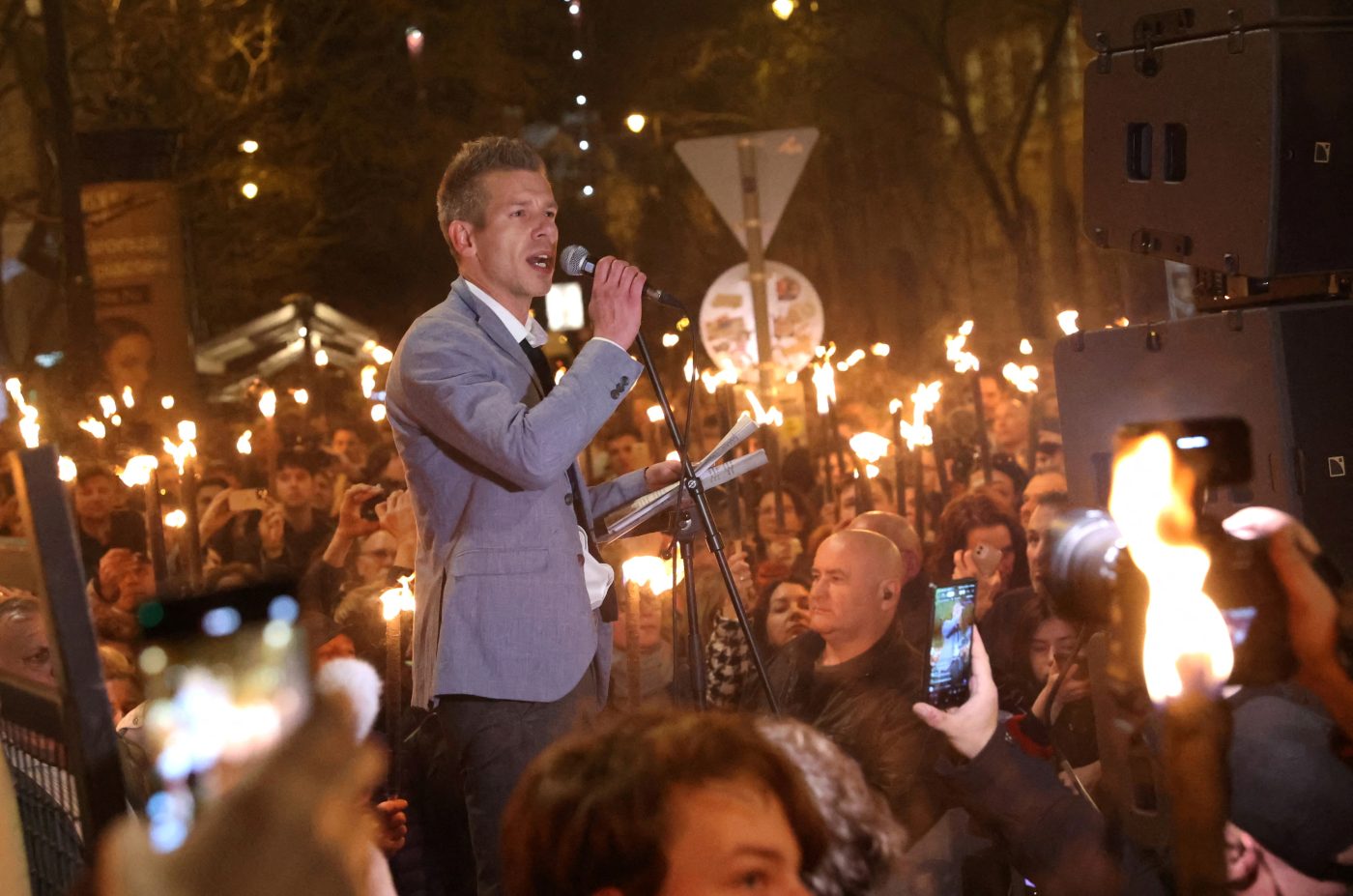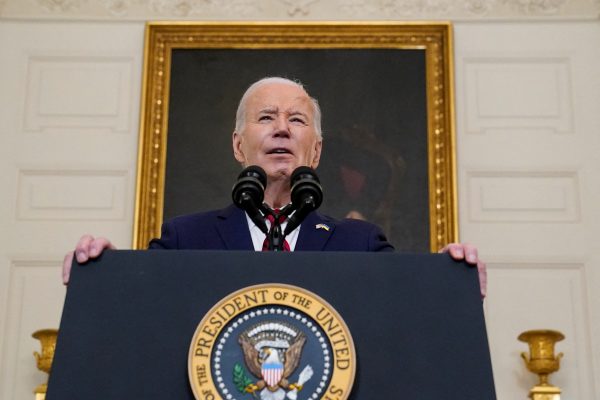Viktor Orbán’s illiberal government is facing its biggest crisis for almost a decade. The drama began in February when a lawyer discovered, by chance, that President Katalin Novák, a prime ministerial ally, had pardoned a man convicted for assisting a pedophile. It has only deepened since.
This is all the more remarkable given Orbán’s iron grip on Hungary’s institutions and most of its media. Its outcome is unknowable, but the formerly confident government and its friends are visibly rattled.
The initial crisis struck precisely at the heart of the government’s self-proclaimed character. Orbán’s appeal is founded on ultraconservative rhetoric, including the argument that children must be protected from supposedly evil-minded LGBT+ people and Western NGOs. That case becomes hard to make when the administration is found to be covertly pardoning a well-connected individual convicted for helping to cover up child abuse.
Two large protests took place in February, indicating the severity of the outrage (the government’s own polling will no doubt have conveyed the same message.)
Ignoring the scandal was therefore not an option. Novák’s pardon ended not only her political career but also that of another prominent Fidesz politician, the former justice minister Judit Varga, who had countersigned the document.
It also forced former government minister – and Orbán confidant – Zoltán Balog, who had lobbied for the pardon, to resign as de facto head of the Hungarian Reformed Church.
Throughout, the governing Fidesz party and loyalist media outriders worked quickly and ruthlessly, with politicians resigning and retiring as soon as Orbán made a decision to cut them loose (in the case of Novák and Varga), and pro-government influencers engaging in an orchestrated campaign to usher out those who would not go (in the case of Balog.)
Fidesz’s political communication machine quickly found a spin on the scandal, highlighting that Novák and Varga suffered consequences, and accusing the opposition parties of being the real child abusers.
And yet the most fearsome enemy for Fidesz’s turned out to be not the opposition, but itself.
One of the unforeseen consequences of the scandal was the emergence of Péter Magyar, the ex-husband of Varga, who was until February a Fidesz insider. He has now become an anti-government rabble-rouser able to rally those outraged by endemic corruption (Hungary is the most graft-ridden country in the EU, according to Transparency International).
Magyar, who resigned his positions in state-owned companies shortly after the pardon scandal forced his ex-wife to retire from politics, has since toured independent media, gradually drip-feeding information about corruption and power abuse within the governing party.
His main target has been Antal Rogán, a key figure in the Orbánite system who is head of the Prime Minister’s Cabinet Office. By March 15, public interest in Magyar grew to such an extent that he was able to gather tens of thousands of people for an anti-government protest on Hungary’s national day where he also announced his intention to launch a centrist and pro-Western political party.
A week later, Magyar dropped his biggest bombshell yet. He shared — with the Prosecutor’s office, but also online — an audio recording that he claimed was a private conversation between himself and Varga last year when the couple was still married and she was justice minister.
In the recording, Varga seems to confirm that Rogán had inappropriately intervened in the work of the Prosecutor’s Office in a major corruption case. Varga was also heard lamenting that the Chief Prosecutor, another Orbán ally, was failing to “control” his staff investigating alleged government wrongdoing. Magyar then hinted that he had other tapes. In response, his ex-wife said she had been terrified of her husband and had said what he wanted to hear.
The recording provided a rare window to the inner workings of Orbán’s system and the political use of the justice system – and led to yet another protest led by Magyar, now demanding the resignation of not only Rogán but also Orbán himself.
Rogán, who oversees government communications — which includes centrally managed media outlets and influencers — as well as domestic intelligence services, is no small fry. He is arguably Fidesz’s second or third-most influential person.
So it’s not surprising that he has been heavily targeted by the government’s media machine, which has also sharply increased its social media spending. As in past cases, Fidesz essentially tried to change the conversation. However, initial attempts to discredit Magyar by accusing him of lavish living did not work.
Days after the March 15 rally, ex-minister Varga began accusing Magyar of allegedly abusive behavior while they had been married. A police report of a domestic brawl in 2020 surfaced, with Fidesz’s media and influencers immediately turning up the volume. Varga then gave a long talk-show interview, providing details of the abuse she claimed to have suffered.
Varga’s claims of course should not be dismissed simply because of her political background. However, it’s unusual for most of Orbán’s allies and media avatars to take an interest in misogyny and violence against women, when other high-profile cases have not attracted the same scrutiny.
Does any of this matter? Well yes. Magyar’s rise, while interesting, had seemed a familiar tale. He was not the first former Fidesz person to turn his back on Orbán and accuse the government of corrupt practices. He was not the first self-identified right-wing politician whom a large number of undecided voters flocked to in the hope of unthroning both Fidesz and its sclerotic opposition.
But Varga’s interview was a first. Such an airing of dirty laundry may prompt voters of all varieties to question the kind of people awarded high positions under Orbán. The fact it happened, with amplification from the government itself, suggests that senior government figures are also asking themselves about the potential political costs.
It is unclear, at this point, to what extent Magyar’s message will resonate with voters, especially once the excitement of novelty dies down. But as the case unfolds, it could also fuel existing rivalries within Fidesz, and it is unclear if Orbán will be able to keep these under wraps.
One thing is certain; the crisis makes domestic politics is more turbulent than at any time 2015 when Lajos Simicska, Orbán’s confidant and his party’s financial mastermind, publicly denounced him.
Orbán eventually survived the turbulence and solidified his rule. The situation is different today. His control of the government is stronger than it was, making his odds of repeating the feat not bad. But we cannot know that until the full scale of the threat becomes clear, and for now that is only just emerging.
András Tóth-Czifra is a Hungarian-born political analyst based in New York. He is currently a fellow with the Eurasia Program of the Foreign Policy Research Institute.




